大学英语2第5单元资料
- 格式:doc
- 大小:65.50 KB
- 文档页数:7
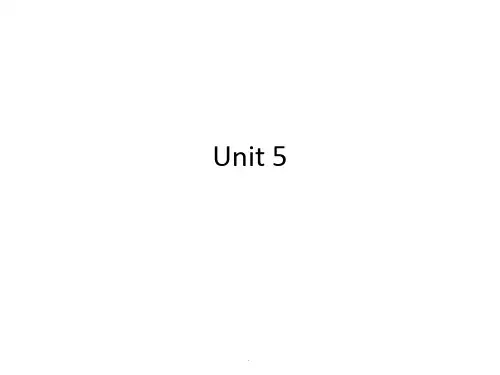
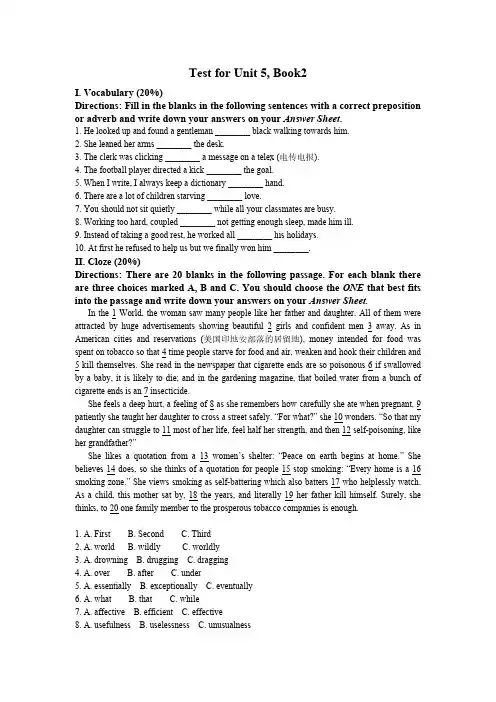
Test for Unit 5, Book2I. Vocabulary (20%)Directions: Fill in the blanks in the following sentences with a correct preposition or adverb and write down your answers on your Answer Sheet.1. He looked up and found a gentleman ________ black walking towards him.2. She leaned her arms ________ the desk.3. The clerk was clicking ________ a message on a telex (电传电报).4. The football player directed a kick ________ the goal.5. When I write, I always keep a dictionary ________ hand.6. There are a lot of children starving ________ love.7. You should not sit quietly ________ while all your classmates are busy.8. Working too hard, coupled ________ not getting enough sleep, made him ill.9. Instead of taking a good rest, he worked all ________ his holidays.10. At first he refused to help us but we finally won him ________.II. Cloze (20%)Directions: There are 20 blanks in the following passage. For each blank there are three choices marked A, B and C. You should choose the ONE that best fits into the passage and write down your answers on your Answer Sheet.In the 1 World, the woman saw many people like her father and daughter. All of them were attracted by huge advertisements showing beautiful 2 girls and confident men 3 away. As in American cities and reservations (美国印地安部落的居留地), money intended for food was spent on tobacco so that 4 time people starve for food and air, weaken and hook their children and 5 kill themselves. She read in the newspaper that cigarette ends are so poisonous 6 if swallowed by a baby, it is likely to die; and in the gardening magazine, that boiled water from a bunch of cigarette ends is an 7 insecticide.She feels a deep hurt, a feeling of 8 as she remembers how carefully she ate when pregnant, 9 patiently she taught her daughter to cross a street safely. “For what?” she 10 wonders. “So that my daughter can struggle to 11 most of her life, feel half her strength, and then 12 self-poisoning, like her grandfather?”She likes a quotation from a 13 women’s shelter: “Peace on earth begins at home.” She believes 14 does, so she thinks of a quotation for people 15 stop smoking: “Every home is a 16 smoking zone.” She views smoking as self-battering which also batters 17 who helplessly watch. As a child, this mother sat by, 18 the years, and literally 19 her father kill himself. Surely, she thinks, to 20 one family member to the prosperous tobacco companies is enough.1. A. First B. Second C. Third2. A. world B. wildly C. worldly3. A. drowning B. drugging C. dragging4. A. over B. after C. under5. A. essentially B. exceptionally C. eventually6. A. what B. that C. while7. A. affective B. efficient C. effective8. A. usefulness B. uselessness C. unusualness9. A. now B. who C. how10. A. somewhat B. some times C. sometimes11. A. breath B. breathe C. breathing12. A. die of B. killed by C. being13. A. battering B. battered C. batters14. A. everybody B. everything C. everywhere15. A. for B. to C. of16. A. no B. none C. not17. A. they B. those C. them18. A. for B. through C. with19. A. watching B. watches C. watched20. A. loose B. lose C. loosenIII. Fast Reading (20%)Directions: In this part, your will go over the passage quickly and answer the questions.For questions 1-5, choose the best answers to the questions.For questions 6-10, markY (for YES) if the statement agrees with the information giver in the passage;N (for NO) if the statement contradicts the information given in the passage;NG (for NOT GIVEN) if the information is not given in the passage.The Bermuda TriangleThe Bermuda Triangle (百慕大三角地区) is a region of the western Atlantic Ocean, which has become associated in the popular imagination with mysterious maritime (海上的) disasters. Also known as the Devil’s Triangle, the triangle-based area covers about 1,140,000 sq km between the island of Bermuda, the coast of southern Florida, and Puerto Rico.The evil reputation of the Bermuda Triangle may be traceable (可追溯的) to reports made in the late 15th century by navigator Christopher Columbus concerning the Sargasso Sea, in which floating masses of gulfweed were regarded as strange and dangerous by early sailors; others date the notoriety (恶名) of the area to the mid-19th century, when a number of reports were made of unexplained disappearances and mysteriously abandoned ships. The earliest recorded disappearance of a United States vessel in the area occurred in March 1918, when the USS Cyclops vanished (消失).The incident that consolidated (加强) the reputation of the Bermuda Triangle was the disappearance in December 1945 of Flight 19, a training squadron (中队) of five U.S. Navy bombers. The squadron left Fort Lauderdale, Florida, with 14 crewmen and disappeared after radioing a series of distress messages; a seaplane sent in search of the squadron also disappeared. Aircraft that have disappeared in the area since this incident include a DC-3 carrying 27 passengers in 1948 and a C-124 with 53 passengers in 1951. Among the ships that have disappeared was the tanker Marine Sulphur Queen, which vanished with 39 men aboard in 1963.Books, articles, and television broadcasts investigating the Bermuda Triangle emphasize that, in the case of most of the disappearances, the weather was favorable, the disappearances occurred in daylight after a sudden break in radio contact, and the vessels vanished without a trace.However, skeptics (持怀疑态度的人) point out that many supposed mysteries result from careless or biased consideration of data. For example, some losses attributed to the Bermuda Triangle actually occurred outside the area of the triangle in severe weather conditions or in darkness, and some can be traced to known mechanical problems or inadequate equipment. In the case of Flight 19, for example, the squadron failed to follow instructions, and the aircraft were operating under conditions of deteriorating (越来越糟的) weather and visibility and with a low fuel supply. Other proposed explanations for disappearances in the Bermuda Triangle include the action of physical forces unknown to science, a “hole in the sky,” and an unusual chemical component in the region’s seawater.1. The Bermuda Triangle is located ________.A. to the south of AmericaB. in the Pacific OceanC. in the eastern Atlantic OceanD. to the south of Puerto Rico2. The Bermuda Triangle was believed to be a dangerous area in the late 15th century because ________.A. many ships disappeared thereB. many ships were mysteriously abandoned thereC. the waves were regarded as odd and dangerousD. the large quantity of seaweeds there were thought dangerous3. Some skeptics believe that the mysterious disappearance of ships and planes in the Bermuda Triangle is caused by the following except ________.A. mechanical problemsB. poor visibilityC. a sudden break in radio contactD. bad weather conditions4. According to the passage, how many planes disappeared in 1945 in the Bermuda Triangle?A. FiveB. SixC. SevenD. Eight5. When Flight 19 disappeared, the squadron ________.A. was on the way to FloridaB. was in trainingC. was carrying out a bombing missionD. was flying with a sufficient fuel supply( ) 6. Flight 19 sent some radio messages back when receiving a series of distress messages. ( ) 7. The unexplained disappearance of the first American ship occurred in the early 19th century. ( ) 8. The weather was fair when all the disappearances actually happened around the Bermuda Triangle.( ) 9. Scientists have found a clue to the mystery of the Devil’s Triangle.( ) 10. According to some skeptics, the fact that the squadron failed to locate its position might be one of the reasons for the disappearance of Flight 19.IV. Reading comprehension (30%)Directions: There are 3 passages in this part. Each passage is followed by somequestions. For each of them there are four choices marked A, B, C and D. You should decide on the best choice and write down your answers on your Answer Sheet.Passage OneLife really should be one long journey of joy for children who are born with a world of wealth at their tiny feet. But experts on psychological research now believe that silver spoons can leave a bitter taste. If suicide statistics are a sign of happiness, then the rich are a miserable lot. Figures show that it is the rich who most often do away with themselves.Dr. Robert Coles, an internationally famous doctor, is the world’s top expert on the influence of money on children. He has written a well-received book on the subject, The Privileged (享有特权的) Ones, and his research shows that too much money in the family can cause as too many problems as too little. “Obviously there are certain advantages to being rich,” says the 53-year-old doctor, “such as better health, education and future work expectation. But most important is the quality of family life. Money can’t buy love. ”It can buy a lot of other things, though, and that’s where the trouble starts. Rich kids have so much to choose from that they often become confused. Their parents’ over favoring can make them spoiled. They tend to travel more than other children, from home to home and country to country, which often makes them feel restless.“But privileged children do have a better sense of their positions in the world,” adds Mr. Coles, “and they are more self-assured.”Today’s rich parents perhaps have realized that their riches can be more of a burden (负担) than a favor to their children. So their priority (优先考虑的事) is to ensure that their families are as rich in love as they are in money.1. According to the passage, children of rich families ________.A. enjoy travelingB. can buy loveC. usually commit suicideD. are not always happy2. Dr. Robert Coles believes that ________.A. being rich has as many advantages as being poorB. rich children often get too little entertainmentC. rich children sometimes can’t enjoy the things they are most in need ofD. rich children aren’t given enough things3. Which of the following statements is Not TRUE according to the passage?A. It is love that is always lacking in rich and poor families alike.B. Silver spoons can sometimes leave a bitter taste.C. Money can’t buy everything.D. Rich children are often confused because they have so much to choose from.4. The expression “silver spoons” in Paragraph 1 means ________.A. very expensive spoonsB. rich peopleC. wealthD. spoons made of silver5. This article is written mainly to tell readers that ________.A. the rich are more likely to do away with themselvesB. money can bring a lot of things, including loveC. life is always happy for children of rich parentsD. rich parents should realize what is important in the family is love rather than moneyPassage TwoDo parents owe their children anything? Yes, they owe them a great deal.One of their chief duties is to give their children a sense of personal worth, for self-esteem (自尊心) is the base of a good mental health. A youngster who is always made to feel stupid, often compared to brighter brothers, sisters, or cousins, will not feel confident and become so afraid of failing, that he (or she) won’t try at all. Of course, they should be corrected when they do wrong; this is the way children learn. But the criticisms should be balanced with praises.Parents owe their children firm guidance and consistent discipline. It is frightening for a youngster to feel that he is in charge of himself; it is like being in a car without brakes (刹车). The parent who says “No” when other parents say “Yes” sends a double message. He is also saying, “I love you, and I am ready to risk your anger, because I don’t want you to get into trouble.”Parents owe their children a comfortable feeling about their body, and enough information about sex to balance the wrong information that they will surely receive from their friends.Parents owe their children privacy (隐私权) and respect for their personal things. This means not borrowing things without being permitted, not reading diaries and mails, not looking through pockets. If a mother feels that she must read her daughter’s diary to know what’s going on, the communication between them must be pretty bad.Parents owe their children a set of solid values around which to build their lives. This means teaching them to respect the rights and opinions of others; it means respecting elders, teachers, and the law. The best way to teach such values is by example. A child who is lied to will lie. A child who sees his parents steal tools from the factory or towels from a hotel will think that it is all right to steal. A youngster who sees no laughter and no love in the home will have a difficult time laughing and loving.No child asks to be born. If you bring a life into the world, you owe the child something. And if you give him his due, he’ll have something of value to pass along to your grandchildren.6. According to the passage, parents owe their children the following things except ________.A. carsB. privacyC. respect of selfD. information about their body7. The writer thinks that teenagers are frightened when they are in charge of themselves because ________.A. they don’t know how to stop a car without brakesB. there is no one to guide and discipline themC. they are afraid of being left aloneD. there is no one to ask for help when in trouble8. Which of the following ways is advised for parents to show love to their children?A. Saying “Yes” to everything the children ask for.B. Never embracing older children.C. Refusing something to their children.D. Never criticizing children.9. The word “due” in the last paragraph means ________.A. something one should do or finish before a fixed timeB. reasonable explanation(s) or plan(s)C. what must be given to someone because it is right or owingD. the money to be paid10. Which of the following statements is TRUE according to the passage?A. Parents prefer to let their children be in charge of their own lives at an early age.B. Children learn much by seeing what their parents do.C. Children shouldn’t be corrected because it destroys their self-esteem.D. It is better to compare a youngster to his brighter brothers because it makes him try harder.Passage ThreeTrees should only be pruned (修剪) when there is a good and clear reason for doing so and , fortunately, the number of such reasons is small. Pruning involves the cutting away of overgrown and unwanted branches, and the inexperienced gardener can be encouraged by the thought that more damage results from doing it unnecessarily than from leaving the tree to grow in its own way.First, pruning may be done to make sure that trees have a desired shape or size. The objective may be to get a tree of the right height, and at the same time to help the growth of small side branches which will thicken its appearance or give it a special shape. Secondly, pruning may be done to make the tree healthier. You may cut down diseased or dead wood, or branches that are rubbing against each other and thus cause wounds. The health of a tree may be encouraged by removing branches that are blocking up the centre and so preventing the free movement of air.One result of pruning is that an open wound is left on the tree and this provides an easy entry for disease, but it is a wound that will heal. Often there is a race between the healing and the disease as to whether the tree will live or die, so that there is a period when the tree is at risk. It should be the aim of every gardener to keep what has been pruned smooth and clean, for healing will be slowed down by roughness. You should allow the cut surface to dry for a few hours and then paint it with one of the substances available from garden shops produced especially for this purpose. Pruning is usually done without the interference from the leaves and also it is very likely that the cuts you make will bleed. If this does happen, it is, of course, impossible to paint them properly.11. Pruning may be done to ______.A. make the tree grow tallerB. improve the shape of the treeC. get rid of the small branchesD. make the small branches thicker12. Trees become unhealthy if the gardener ______.A. allows too many branches to grow in the middleB. does not protect them from windC. forces them to grow too quicklyD. damages some of the small side branches13. Why is a special substance painted on the tree?A. To make a wound smoothB. To prevent disease entering a woundC. To cover a rough surfaceD. To help a wound to dry14. A good gardener prunes a tree______.A. at intervals throughout the yearB. as quickly as possibleC. occasionally when necessaryD. regular every winter15. What was the author's purpose when writing this passage?A. To give practical instruction for pruning a tree.B. To give a general description of pruningC. To explain how trees develop diseasesD. To discuss different methods of pruning.V. Translation (10%)Direction: Translate Sentences 1-3 into English and Sentences 4-5 into Chinese and write down your answers on your Answer Sheet.1. 我父亲太忘事,老是在找钥匙。
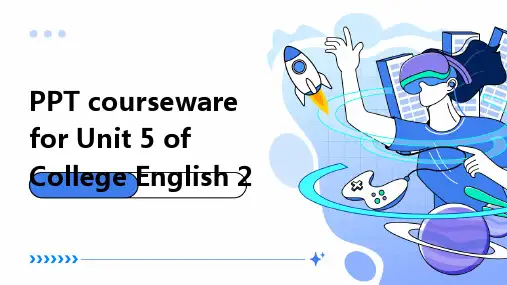
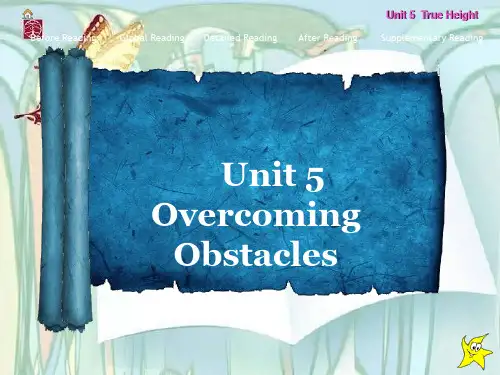
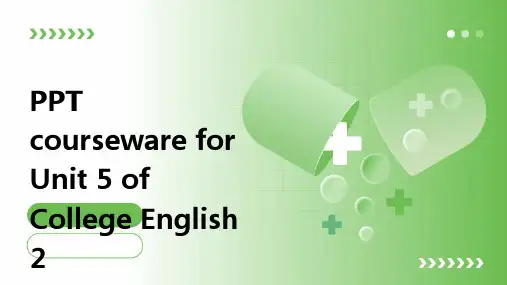
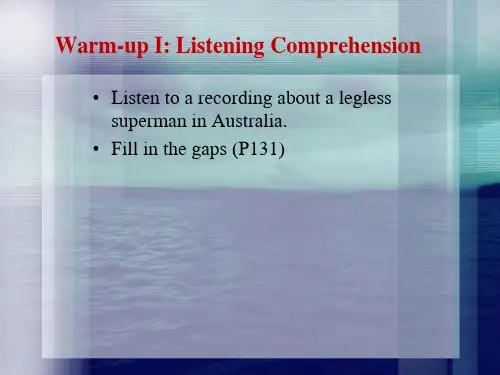
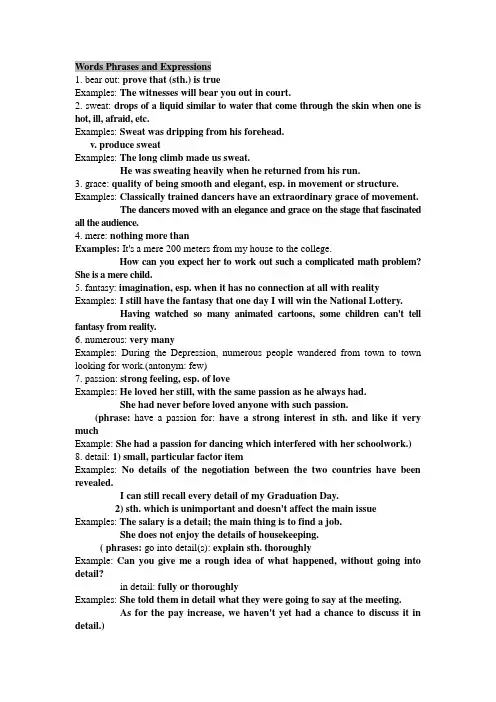
Words Phrases and Expressions1. bear out: prove that (sth.) is trueExamples: The witnesses will bear you out in court.2. sweat: drops of a liquid similar to water that come through the skin when one is hot, ill, afraid, etc.Examples: Sweat was dripping from his forehead.v. produce sweatExamples: The long climb made us sweat.He was sweating heavily when he returned from his run.3. grace: quality of being smooth and elegant, esp. in movement or structure. Examples: Classically trained dancers have an extraordinary grace of movement.The dancers moved with an elegance and grace on the stage that fascinated all the audience.4. mere: nothing more thanExamples: It's a mere 200 meters from my house to the college.How can you expect her to work out such a complicated math problem? She is a mere child.5. fantasy: imagination, esp. when it has no connection at all with reality Examples: I still have the fantasy that one day I will win the National Lottery.Having watched so many animated cartoons, some children can't tell fantasy from reality.6. numerous: very manyExamples: During the Depression, numerous people wandered from town to town looking for work.(antonym: few)7. passion: strong feeling, esp. of loveExamples: He loved her still, with the same passion as he always had.She had never before loved anyone with such passion.(phrase: have a passion for:have a strong interest in sth. and like it very muchExample: She had a passion for dancing which interfered with her schoolwork.)8. detail: 1) small, particular factor itemExamples: No details of the negotiation between the two countries have been revealed.I can still recall every detail of my Graduation Day.2) sth. which is unimportant and doesn't affect the main issue Examples: The salary is a detail; the main thing is to find a job.She does not enjoy the details of housekeeping.( phrases: go into detail(s): explain sth. thoroughlyExample:Can you give me a rough idea of what happened, without going into detail?in detail: fully or thoroughlyExamples: She told them in detail what they were going to say at the meeting.As for the pay increase, we haven't yet had a chance to discuss it in detail.)9. recur: come or happen againExamples: The theme of love recurred in many of his books.The school authorities warned the student that he will be expelled if this cheating recurs.10. coincide: 1) happen at the same time (followed by with)Examples: The art exhibition coincides with the 50th anniversary of his death.2) be in agreement (with)Examples: He gave great encouragement to his students, especially if their passions happened to coincide with his own.Our interests coincide.11. core: the most important partExamples: The core of the problem is their objection to educational reform.The belief in free enterprise is at the core of their political thinking. 12. alternate: every other or second; happening by turnsExamples: He experienced alternate bouts of depression and cheerfulness within one flay.We spend alternate Sundays with my husband's parents.13. relax: make or become less tense, worded or nervousExamples: Massage is used to relax muscles.After a hard day's work, he liked to relax by going for a swim.14. on one/two/several occasion(s): once/twice/several times in the past Examples: On several occasions, I attempted to talk with my parents about my taking a part-time job, but my mother instantly interrupted me by asking me questions about my studies.He drinks far too much. On occasion I saw him drink a whole bottle of vodka.15. vain: too pleased with one's own abilities or looksExamples: Too much praise cart can make a person vain.She was vain of/about her appearance.16. emotion: a strong feeling of any kindExamples: Love, joy, hate, fear and jealousy are all emotions,Jack is a man of great emotion, easily given to tears.17. preparation: the act or process of preparingExamples: Banks have made adequate preparations for the introduction of the curd, the new common currency in 12 European countries.I am not worried about the exams --- I've done lots of preparation,18. be ashamed of: feeling foolish or uncomfortable because of (sth.) Examples: She was so ashamed of cheating in the test that she went and told the teacher.You should be ashamed of yourself, telling lies at your age.19. startle: give a sudden shock or surprise toExamples: You startled me -- I didn't hear you come in.Goodness, how you startled me appearing out of nowhere like that! 20. intensity: the state of being intenseExamples:In order to finish the job in time, we have to work with greater intensity.Looking at her with intensity, the man said, "Would you please marry me?"21. anxiety: a feeling of worry or fearExamples: Many people expressed their anxieties about the economic chaos in the country.A good cry can be a healthy way to relieve your anxiety.22. tension: worry or nervousnessExamples: Tensions between India and Pakistan have risen since the December 13 attack on the Indian Parliament.Smiling and laughing has been shown to relieve tension and stress.23. tense: feeling worried or nervous; making people worried or nervous Examples: Facing so many teachers, John got very tense and made several mistakes in his recitation.The flight had been postponed five hours and all of the passengers were getting tense.24. along with: together withExamples: Along with hundreds of others he had invested money in stocks and bonds.I keep my checks in the top drawer, along with my other important documents.25. stretch out: hold a part of your body straight out in front of you Examples: She stretched out a hand and lifted the glass to her lips.There were beggars everywhere, pathetically stretching their hands out to passers-by.26. bring (sb.) back to earth: cause (sb.) to stop day-dreaming; cause (sb.) to return to realityExamples: Emily's voice brought him back to earth.Jack had been spending all his time chatting on line with his key-pals until his parents had a word with him and brought him back to earth.27. in one's mind's eye: in one's imagination; in one's memoryExamples: In his mind's eye, she is still a shy gift.In my mind's eye, I can still see the house where I was born.28. congratulate:tell (sb.) that one is pleased about his good fortune or achievements (followed by on)Examples: His teachers congratulated him on winning the first prize in the speech contest.My son has been promoted to CEO. We must write to congratulate him.29. media:(collective noun) means of mass communication, e.g. TV, radio, newspapersExamples: They are wondering whether bias in the news media contributed to the candidate's defeat.Much of what children learn comes directly from the mass media.。
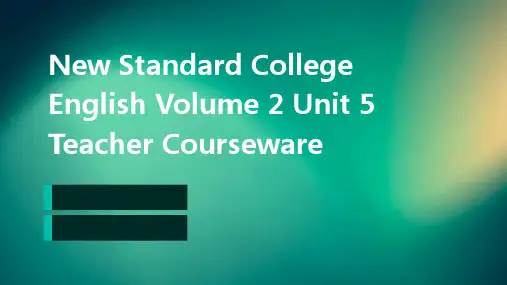
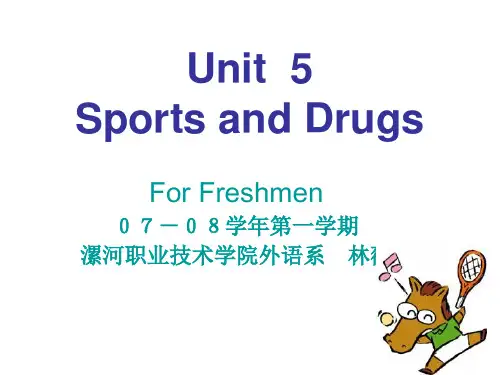
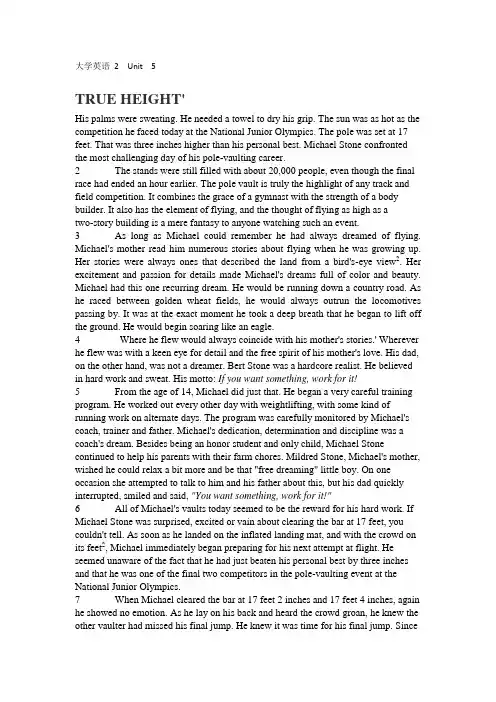
大学英语2 Unit 5TRUE HEIGHT'His palms were sweating. He needed a towel to dry his grip. The sun was as hot as the competition he faced today at the National Junior Olympics. The pole was set at 17 feet. That was three inches higher than his personal best. Michael Stone confronted the most challenging day of his pole-vaulting career.2 The stands were still filled with about 20,000 people, even though the final race had ended an hour earlier. The pole vault is truly the highlight of any track and field competition. It combines the grace of a gymnast with the strength of a body builder. It also has the element of flying, and the thought of flying as high as atwo-story building is a mere fantasy to anyone watching such an event.3 As long as Michael could remember he had always dreamed of flying. Michael's mother read him numerous stories about flying when he was growing up. Her stories were always ones that described the land from a bird's-eye view2. Her excitement and passion for details made Michael's dreams full of color and beauty. Michael had this one recurring dream. He would be running down a country road. As he raced between golden wheat fields, he would always outrun the locomotives passing by. It was at the exact moment he took a deep breath that he began to lift off the ground. He would begin soaring like an eagle.4 Where he flew would always coincide with his mother's stories.' Wherever he flew was with a keen eye for detail and the free spirit of his mother's love. His dad, on the other hand, was not a dreamer. Bert Stone was a hardcore realist. He believed in hard work and sweat. His motto: If you want something, work for it!5 From the age of 14, Michael did just that. He began a very careful training program. He worked out every other day with weightlifting, with some kind of running work on alternate days. The program was carefully monitored by Michael's coach, trainer and father. Michael's dedication, determination and discipline was a coach's dream. Besides being an honor student and only child, Michael Stone continued to help his parents with their farm chores. Mildred Stone, Michael's mother, wished he could relax a bit more and be that "free dreaming" little boy. On one occasion she attempted to talk to him and his father about this, but his dad quickly interrupted, smiled and said, "You want something, work for it!"6 All of Michael's vaults today seemed to be the reward for his hard work. If Michael Stone was surprised, excited or vain about clearing the bar at 17 feet, you couldn't tell. As soon as he landed on the inflated landing mat, and with the crowd on its feet2, Michael immediately began preparing for his next attempt at flight. He seemed unaware of the fact that he had just beaten his personal best by three inches and that he was one of the final two competitors in the pole-vaulting event at the National Junior Olympics.7 When Michael cleared the bar at 17 feet 2 inches and 17 feet 4 inches, again he showed no emotion. As he lay on his back and heard the crowd groan, he knew the other vaulter had missed his final jump. He knew it was time for his final jump. Sincethe other vaulter had fewer misses, Michael needed to clear this vault to win. A miss would get him second place. Nothing to be ashamed of, but Michael would not allow himself the thought of not winning firstplace.8 He rolled over and did his routine of three finger-tipped push-ups. He found his pole, stood and stepped on the runway that led to the most challenging event of his 17-year-old life.9 The runway felt different this time. It startled him for a brief moment. Then it all hit him like a wet bale of hay1. The bar was set at nine inches higher than his personal best. That's only one inch off the National record, he thought. The intensity of the moment filled his mind with anxiety. He began shaking the tension. It wasn't working. He became more tense. Why was this happening to him now, he thought. He began to get nervous. Afraid would be a more accurate description. What was he going to do? He had never experienced these feelings. Then out of nowhere, and from the deepest depths of his soul, he pictured his mother. Why now? What was his mother doing in his thoughts at a time like this? It was simple. His mother always used to tell him when you felt tense, anxious or even scared, take deep breaths.10 So he did. Along with shaking the tension from his legs, he gently laid his pole at his feet. He began to stretch out his arms and upper body. The light breeze that was once there was now gone. He carefully picked up his pole. He felt his heart pounding. He was sure the crowd did, too. The silence was deafening. When he heard the singing of some distant birds in flight, he knew it was his time to fly.11 As he began sprinting down the runway, something felt wonderfully different, yet familiar. The surface below him felt like the country road he used to dream about. Visions of the golden wheat fields seemed to fill his thoughts. When he took a deep breath, it happened. He began to fly. His take-off was effortless. Michael Stone was now flying, just like in his childhood dreams. Only1 this time he knew he wasn't dreaming. This was real. Everything seemed to be moving in slow motion. The air around him was the purest and freshest he had ever sensed. Michael was soaring like an eagle.12 It was either the eruption of the people in the stands or the thump of his landing that brought Michael back to earth. On his back with that wonderful hot sun on his face, he knew he could only see in his mind's eye the smile on his mother's face. He knew his dad was probably smiling too, even laughing. What he didn't know was that his dad was hugging his wife and crying. That's right: Bert "If You Want It, Work For It" Stone was crying like a baby in his wife's arms. He was crying harder than Mildred had ever seen before. She also knew he was crying the greatest tears of all: tears of pride. Michael was immediately surrounded by people hugging and con-gratulating him on the greatest accomplishment of his life. He later went on that dayto clear 17 feet 6V2 inches: a National and International Junior Olympics record.13 With all the media attention and sponsorship possibilities, Michael's life would never be the same again. It wasn't just because he won the National Junior Olympics and set a new world record. And it wasn't because he had just increased his personal best by 9Vz inches. It was simply because Michael Stone is blind.FOURTEEN STEPS1They say a cat has nine lives2, and I am inclined to think that possible since I am now living my third life and I'm not even a cat.2 My first life began on a clear, cold day in November, 1904, when I arrived as the sixth of eight children of a farming family. My father died when I was 15, and we had a hard struggle to make a living. I had to wait until the early years of my marriage before I really began to enjoy my first life. But then I was very happy, in excellent health, and quite a good athlete. My wife and I became the parents of two lovely girls. I had a good job in San Jose and a beautiful home in San Carlos.3 Life was a pleasant dream.4 Then the dream ended and became one of those horrible nightmares that cause you to wake in a cold sweat in the middle of the night. I began to suffer from a slowly progressive disease of the motor nerves, affecting first my right arm and leg, and then my other side.5 Thus began my second life....6 In spite of my disease I still drove to and from work each day, with the aid of special equipment installed in my car. And I managed to keep healthy and optimistic, to a degree, because of 14 steps.7 Crazy? Not at all.8 Our home was a split-level affair1with 14 steps leading up from the garage to the kitchen door. Those steps were my yardstick, my challenge to continue living.(1)1 felt that if the day arrived when I was unable to lift one foot up one step and then drag the other painfully after it—repeating the process 14 times until, utterly spent2.1 would be through — I could then admit defeat and lie down and die.9 Sol kept on working, kept on climbing those steps. And time passed. The girls went to college and were happily married, and my wife and I were alone in our beautiful home with the 14 steps.10 You might think that here walked a man of courage and strength. Not so. Here hobbled a bitterly disillusioned cripple, a man who held on to his sanity and his wife and his home and his job because of 14 miserable steps leading up to the back door from his garage.11 As I became older, I became more disillusioned and frustrated. I'm sure that my wife and friends had some unhappy times when I chose to talk about my philosophy of life. (2) I believed that in this whole world I alone . had been chosen to suffer. Ihad carried my cross3now for nine years and probably would bear it for as long as I could climb those 14 steps.12 Then on a dark night in August, 1971,1 began my third life. It was raining when I started home that night, beating down hard on the car as I drove slowly down one of the less-traveled roads. Suddenly the steering 4 wheel jumped in my hands as one of the tires burst with a bang. I fought the car to a stop and sat there as the terrible nature of the situation swept over me. It was impossible for me to change that tire! Utterly impossible!13 A thought that a passing motorist might stop was dismissed at once. Why should anyone? I knew I wouldn't! Then I remembered that a short distance up a little side road was a house. I started the engine and drove slowly along until I came to the house. Lighted windows welcomed me as I pulled into the driveway and honked the horn.14 The door opened and a little girl stood there, peering at me. I rolled down the window and called out that I had a flat and needed someone to change it for me because I had a crutch and couldn't do it myself.15 She went into the house and a moment later came out bundled in raincoat and hat, followed by a man who called a cheerful greeting.16 I sat there comfortable and dry, and felt a bit sorry for the man and the little girl working so hard in the storm. Well, I would pay them for it. The rain seemed to be easing a bit now, and I rolled down the window to watch. It seemed to me that they were awfully slow and I was beginning to become impatient. I heard the little girl's voice from the back of the car. "Here's the jack-handle, Grandpa." She was answered by the murmur of the man's lower voice and the slow tilting of the car as it was jacked up.17 There followed a long interval of noises and low conversation from the backof the car, but finally it was done. I felt the car bump as the jack was removed, and I heard the slam of the trunk lid, and then they were standing at my car window.18 He was an old man, bent and slightly built. The little girl was about eight or ten, I judged, with a merry face and a wide smile as she looked up at me.19 He said, 'This is a bad night for car trouble, but you're all set now."20 "Thanks," I said, "thanks. How much do I owe you?"21 He shook his head. "Nothing. Cynthia told me you were on crutches. Glad to be of help. I know you'd do the same for me. There's no charge, Mend."22 I held out a five-dollar bill. "No! I like to pay my way."23 He made no effort to take it and the little girl stepped closer to the window and said quietly, "Grandpa can't see it."24 (3) In the next few frozen seconds the shame and horror of that moment penetrated, and I was sick with an intensity I had never felt before. A blind man and a child! Feeling with cold, wet fingers for bolts and tools in the dark— a darkness that for him would probably never end until death.2 5 They changed a tire for me—changed it in the rain and wind, with me i sitting in comfort in the car with my crutch. I don't remember how long I sat there after they said good night and left me, but it was long enough for me to search deep within myself and find some disturbing traits.26 (4) I realized that I was filled to overflowing with self-pity, selfishness, and indifference to the needs of others.«27 I sat there and said a prayer. I prayed for strength, for a greater understanding, for keener awareness of my shortcomings.28 I prayed for blessings upon the blind man and his granddaughter. Finally I drove away, shaken in mind, humbled in spirit.29 I am trying now not only to climb 14 steps each day, but in my small % way to help others. Someday, perhaps, I'll have the chance to help a blind man in equal difficulties—someone as blind as I had been.。
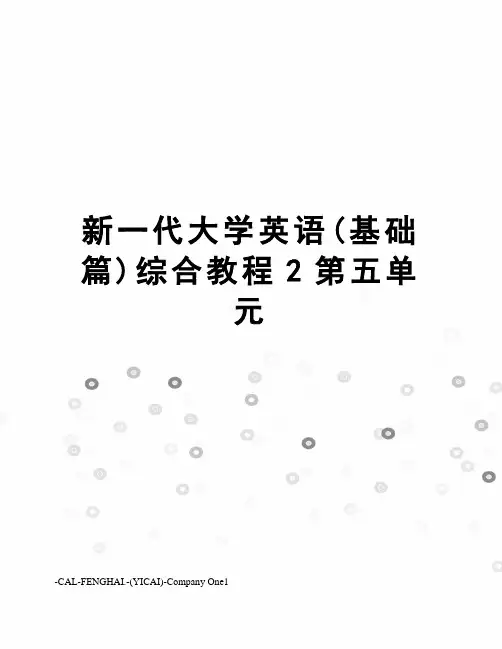
新一代大学英语(基础篇)综合教程2第五单元-CAL-FENGHAI.-(YICAI)-Company One1Unit 5 Loving familyiExplore 15-2 iExplore 1: ReadingViewing 1-21)children2)family3)come back4) one another5)talk about6) work it out7)faith8)loveViewing 1-3Reference:Yes. I always turn to my family, especially my parents. for help whenever I run into problems. I have known for a long time that can completely trust my parents and that every piece of advice comes from their unconditional love. Besides, they are much more learned and experienced thanNo. I don't often seek help from my family when Irun into difficulties. My parents are far away from me, so try not to worry them if can solve problems with help from my friends and teachers. But if it is a serious problem, I will talk it over with my parents before making a decision.5-3 iExplore 1: Building your languageWords and expressions 1-1B A A B B AWords and expressions 1-21)on their mind2)takes3)off4)every bit as5) is grateful6)for7)is8)true of9)won10)over11)was bathed in12)look back onCollocations 1-11.Cared2.deliver3. switch4.treat5. remind6. protested7.take8.relievedCollocations 1-21. dim light2. skip school3. positive encouragement4. bright light5.gives pleasure/brings pleasure6. constant encouragementVocabulary learning strate 1-2B F D EC AVocabulary learning strate 1-31. window frames2.child seat3. dishwasher4. can opener5.birthday6.earthquakeLanguage focus 1-2Reference:1. Bending down in front of me, she gave me advice I carry with to this day: "Be friends with everyone.2. Choking back my tears. I tell her, "The doctor said I couldn't have a baby, so your daddy and I decided to adopt a baby. That baby was you."3. They traveled around the country, living in Florida, Texas, and Boston.4. He seemed relaxed, talking to his guests and laughing often.5. My mother worked in a textile factory, weaving knitwear.Banked cloze1)remembers2)quit3)questione4)stimulating5)seed6)remind7)switch8)pleasure9)encouragement10)meaniExplore 25-4 iExplore:ReadingViewing 1-2ACEViewing 1-3Reference:My group members all choose different things for their childhood room. For A. a football fan since childhood,he would like to put posters of some super stars, like Lionel Messi and Ronaldo on the wall. For B, also my roommate, a music fan as a young boy, he prefers to put aset of hi-fi inthe room. For C, she liked dancing very much when she was young, so she wants to have a big mirror to help her practice dancing. For D, she dreamed of wearing a new dress every day when she was in her elementary school, so she would need a large wardrobe badly. Finally. for me, a boy crazy about racing cars, I would put my collection of racing car models in my childhood room.5-5 iExplore 2: Building your languageWords and expressions 1-11. skinny2.faint3. triggered4.emotional5.cherish6.innocentWords and expressions 1-21. one after another2. wear away3. made his way4. set aside5. were accompanied by6. in comparison toCollocations 1-1ABBAABCollocations 1-21. a stack of textbooks2. a clump of trees3. a bunch of flowers4. a sea of information5.an album of stamps6.a mountain of debtsVocabulary learning strategies 1-2BAABBTranslation 1-2Reference:1.我在一个小镇长大,那里的小学距离我家步行需要十分钟,那时孩子们可以回家吃午饭。
新标准大学英语综合教程2unit5 Unit 5 Friendship。
Friendship is an important part of our lives. It is a relationship of mutual affection between people. In the fast-paced modern society, the value of friendship is often overlooked. However, it is crucial for our emotional well-being and personal growth. In this unit, we will explore the theme of friendship and learn how to build and maintain meaningful relationships with others.First and foremost, it is essential to understand the qualities of a good friend. A good friend is someone who is trustworthy, supportive, and understanding. They are there for you in times of need and celebrate your successes with you. They listen to you without judgment and offer their help and advice when necessary. In return, you should also be a good friend to others by showing empathy, respect, and loyalty.Furthermore, communication is key in any friendship. It is important to express your thoughts and feelings openly and honestly. Good communication helps to resolve conflicts and misunderstandings, and it also strengthens the bond between friends. In addition, spending quality time together is crucial for building and maintaining friendships. Whether it's going out for a meal, watching a movie, or simply having a heart-to-heart conversation, the time spent together helps to create lasting memories and deepen the connection between friends.Moreover, it is important to be a good listener in a friendship. Sometimes, all a friend needs is a listening ear and a shoulder to lean on. By being present and attentive, you show that you care and value the relationship. It is also important to be supportive and encouraging towards your friends. Whether they are facing challenges or pursuing their dreams, your support and encouragement can make a significant difference in their lives.In addition, it is important to be understanding and forgiving in a friendship. No one is perfect, and conflicts and misunderstandings are inevitable in any relationship. It is important to approach these situations with empathy and understanding, and be willing toforgive and move forward. By doing so, you can strengthen the bond with your friends and create a more positive and harmonious relationship.In conclusion, friendship is a valuable and essential part of our lives. It brings joy, support, and companionship, and contributes to our overall happiness and well-being. By understanding the qualities of a good friend, communicating effectively, spending quality time together, being a good listener, and being supportive and understanding, we can build and maintain meaningful friendships that enrich our lives. Let's cherish and nurture our friendships, for they are truly precious.。
T est for Unit 5, Book2I. Vocabulary (20%)Directions: Fill in the blanks in the following sentences with a correct preposition or adverb and write down your answers on your Answer Sheet.1. He looked up and found a gentleman ________ black walking towards him.2. She leaned her arms ________ the desk.3. The clerk was clicking ________ a message on a telex (电传电报).4. The football player directed a kick ________ the goal.5. When I write, I always keep a dictionary ________ hand.6. There are a lot of children starving ________ love.7. Y ou should not sit quietly ________ while all your classmates are busy.8. Working too hard, coupled ________ not getting enough sleep, made him ill.9. Instead of taking a good rest, he worked all ________ his holidays.10. At first he refused to help us but we finally won him ________.II. Cloze (20%)Directions: There are 20 blanks in the following passage. For each blank there are three choices marked A, B and C. Y ou should choose the ONE that best fits into the passage and write down your answers on your Answer Sheet.In the 1 World, the woman saw many people like her father and daughter. All of them were attracted by huge advertisements showing beautiful 2 girls and confident men 3 away. As in American cities and reservations (美国印地安部落的居留地), money intended for food was spent on tobacco so that 4 time people starve for food and air, weaken and hook their children and 5 kill themselves. She read in the newspaper that cigarette ends are so poisonous 6 if swallowed by a baby, it is likely to die; and in the gardening magazine, that boiled water from a bunch of cigarette ends is an 7 insecticide.She feels a deep hurt, a feeling of 8 as she remembers how carefully she ate when pregnant, 9 patiently she taught her daughter to cross a street safely. “For what?” she 10 wonders. “So that my daughter can struggle to 11 most of her life, feel half her strength, and then 12 self-poisoning, like her grandfather?”She likes a quotation from a 13 women’s shelter: “Peace on earth begins at home.”She believes 14 does, so she thinks of a quotation for people 15 stop smoking: “Every home is a 16 smoking zone.” She views smoking as self-battering which also batters 17 who helplessly watch. As a child, this mother sat by, 18 the years, and literally 19 her father kill himself. Surely, she thinks, to 20 one family member to the prosperous tobacco companies is enough.1. A. First B. Second C. Third2. A. world B. wildly C. worldly3. A. drowning B. drugging C. dragging4. A. over B. after C. under5. A. essentially B. exceptionally C. eventually6. A. what B. that C. while7. A. affective B. efficient C. effective8. A. usefulness B. uselessness C. unusualness9. A. now B. who C. how10. A. somewhat B. some times C. sometimes11. A. breath B. breathe C. breathing12. A. die of B. killed by C. being13. A. battering B. battered C. batters14. A. everybody B. everything C. everywhere15. A. for B. to C. of16. A. no B. none C. not17. A. they B. those C. them18. A. for B. through C. with19. A. watching B. watches C. watched20. A. loose B. lose C. loosenIII. Fast Reading (20%)Directions: In this part, your will go over the passage quickly and answer the questions.For questions 1-5, choose the best answers to the questions.For questions 6-10, markY (for YES) if the statement agrees with the information giver in the passage;N (for NO) if the statement contradicts the information given in the passage;NG (for NOT GIVEN) if the information is not given in the passage.The Bermuda T riangleThe Bermuda Triangle (百慕大三角地区) is a region of the western Atlantic Ocean, which has become associated in the popular imagination with mysterious maritime (海上的) disasters. Also known as the Devil’s Triangle, the triangle-based area covers about 1,140,000 sq km between the island of Bermuda, the coast of southern Florida, and Puerto Rico.The evil reputation of the Bermuda Triangle may be traceable (可追溯的) to reports made in the late 15th century by navigator Christopher Columbus concerning the Sargasso Sea, in which floating masses of gulfweed were regarded as strange and dangerous by early sailors; others date the notoriety (恶名) of the area to the mid-19th century, when a number of reports were made of unexplained disappearances and mysteriously abandoned ships. The earliest recorded disappearance of a United States vessel in the area occurred in March 1918, when the USS Cyclops vanished (消失).The incident that consolidated (加强) the reputation of the Bermuda Triangle was the disappearance in December 1945 of Flight 19, a training squadron (中队) of five U.S. Navy bombers. The squadron left Fort Lauderdale, Florida, with 14 crewmen and disappeared after radioing a series of distress messages; a seaplane sent in search of the squadron also disappeared. Aircraft that have disappeared in the area since this incident include a DC-3 carrying 27 passengers in 1948 and a C-124 with 53 passengers in 1951. Among the ships that have disappeared was the tanker Marine Sulphur Queen, which vanished with 39 men aboard in 1963.Books, articles, and television broadcasts investigating the Bermuda Triangle emphasize that, in the case of most of the disappearances, the weather was favorable, the disappearances occurred in daylight after a sudden break in radio contact, and the vessels vanished without a trace.However, skeptics (持怀疑态度的人) point out that many supposed mysteries result from careless or biased consideration of data. For example, some losses attributed to the Bermuda Triangle actually occurred outside the area of the triangle in severe weather conditions or in darkness, and some can be traced to known mechanical problems or inadequate equipment. In the case of Flight 19, for example, the squadron failed to follow instructions, and the aircraft were operating under conditions of deteriorating (越来越糟的) weather and visibility and with a low fuel supply. Other proposed explanations for disappearances in the Bermuda Triangle include the action of physical forces unknown to science, a “hole in the sky,” and an unusual chemical component in the region’s seawater.1. The Bermuda Triangle is located ________.A. to the south of AmericaB. in the Pacific OceanC. in the eastern Atlantic OceanD. to the south of Puerto Rico2. The Bermuda Triangle was believed to be a dangerous area in the late 15th century because ________.A. many ships disappeared thereB. many ships were mysteriously abandoned thereC. the waves were regarded as odd and dangerousD. the large quantity of seaweeds there were thought dangerous3. Some skeptics believe that the mysterious disappearance of ships and planes in the Bermuda Triangle is caused by the following except ________.A. mechanical problemsB. poor visibilityC. a sudden break in radio contactD. bad weather conditions4. According to the passage, how many planes disappeared in 1945 in the Bermuda Triangle?A. FiveB. SixC. SevenD. Eight5. When Flight 19 disappeared, the squadron ________.A. was on the way to FloridaB. was in trainingC. was carrying out a bombing missionD. was flying with a sufficient fuel supply( ) 6. Flight 19 sent some radio messages back when receiving a series of distress messages. ( ) 7. The unexplained disappearance of the first American ship occurred in the early 19th century. ( ) 8. The weather was fair when all the disappearances actually happened around the Bermuda Triangle.( ) 9. Scientists have found a clue to the mystery of the Devil’s Triangle.( ) 10. According to some skeptics, the fact that the squadron failed to locate its position might be one of the reasons for the disappearance of Flight 19.IV. Reading comprehension (30%)Directions: There are 3 passages in this part. Each passage is followed by somequestions. For each of them there are four choices marked A, B, C and D. Y ou should decide on the best choice and write down your answers on your Answer Sheet.Passage OneLife really should be one long journey of joy for children who are born with a world of wealth at their tiny feet. But experts on psychological research now believe that silver spoons can leave a bitter taste. If suicide statistics are a sign of happiness, then the rich are a miserable lot. Figures show that it is the rich who most often do away with themselves.Dr. Robert Coles, an internationally famous doctor, is the world’s top expert on the influence of money on children. He has written a well-received book on the subject, The Privileged (享有特权的)Ones, and his research shows that too much money in the family can cause as too many problems as too little. “Obviously there are certain advantages to being rich,” says the 53-year-old doctor, “such as better health, education and future work expectation. But most important is the quality of family life. Money can’t buy love. ”It can buy a lot of other things, though, and that’s where the trouble starts. Rich kids have so much to choose from that they often become confused. Their parents’over favoring can make them spoiled. They tend to travel more than other children, from home to home and country to country, which often makes them feel restless.“But privileged children do have a better sense of their positions in the world,” adds Mr. Coles, “and they are more self-assured.”Today’s rich parents perhaps have realized that their riches can be more of a burden (负担) than a favor to their children. So their priority (优先考虑的事) is to ensure that their families are as rich in love as they are in money.1. According to the passage, children of rich families ________.A. enjoy travelingB. can buy loveC. usually commit suicideD. are not always happy2. Dr. Robert Coles believes that ________.A. being rich has as many advantages as being poorB. rich children often get too little entertainmentC. rich children sometimes can’t enjoy the things they are most in need ofD. rich children aren’t given enough things3. Which of the following statements is Not TRUE according to the passage?A. It is love that is always lacking in rich and poor families alike.B. Silver spoons can sometimes leave a bitter taste.C. Money can’t buy everything.D. Rich children are often confused because they have so much to choose from.4. The expression “silver spoons” in Paragraph 1 means ________.A. very expensive spoonsB. rich peopleC. wealthD. spoons made of silver5. This article is written mainly to tell readers that ________.A. the rich are more likely to do away with themselvesB. money can bring a lot of things, including loveC. life is always happy for children of rich parentsD. rich parents should realize what is important in the family is love rather than moneyPassage TwoDo parents owe their children anything? Y es, they owe them a great deal.One of their chief duties is to give their children a sense of personal worth, for self-esteem (自尊心) is the base of a good mental health. A youngster who is always made to feel stupid, often compared to brighter brothers, sisters, or cousins, will not feel confident and become so afraid of failing, that he (or she) won’t try at all. Of course, they should be corrected when they do wrong; this is the way children learn. But the criticisms should be balanced with praises.Parents owe their children firm guidance and consistent discipline. It is frightening for a youngster to feel that he is in charge of himself; it is like being in a car without brakes (刹车). The parent who says “No” when other parents say “Y es” sends a double message. He is also saying, “I love you, and I am ready to risk your anger, because I don’t want you to get into trouble.”Parents owe their children a comfortable feeling about their body, and enough information about sex to balance the wrong information that they will surely receive from their friends.Parents owe their children privacy (隐私权) and respect for their personal things. This means not borrowing things without being permitted, not reading diaries and mails, not looking through pockets. If a mother feels that she must read her daughter’s diary to know what’s going on, the communication between them must be pretty bad.Parents owe their children a set of solid values around which to build their lives. This means teaching them to respect the rights and opinions of others; it means respecting elders, teachers, and the law. The best way to teach such values is by example. A child who is lied to will lie. A child who sees his parents steal tools from the factory or towels from a hotel will think that it is all right to steal. A youngster who sees no laughter and no love in the home will have a difficult time laughing and loving.No child asks to be born. If you bring a life into the world, you owe the child something. And if you give him his due, he’ll have something of value to pass along to your grandchildren.6. According to the passage, parents owe their children the following things except ________.A. carsB. privacyC. respect of selfD. information about their body7. The writer thinks that teenagers are frightened when they are in charge of themselves because ________.A. they don’t know how to stop a car without brakesB. there is no one to guide and discipline themC. they are afraid of being left aloneD. there is no one to ask for help when in trouble8. Which of the following ways is advised for parents to show love to their children?A. Saying “Y es” to everything the children ask for.B. Never embracing older children.C. Refusing something to their children.D. Never criticizing children.9. The word “due” in the last paragraph means ________.A. something one should do or finish before a fixed timeB. reasonable explanation(s) or plan(s)C. what must be given to someone because it is right or owingD. the money to be paid10. Which of the following statements is TRUE according to the passage?A. Parents prefer to let their children be in charge of their own lives at an early age.B. Children learn much by seeing what their parents do.C. Children shouldn’t be corrected because it destroys their self-esteem.D. It is better to compare a youngster to his brighter brothers because it makes him try harder.Passage ThreeTrees should only be pruned (修剪) when there is a good and clear reason for doing so and , fortunately, the number of such reasons is small. Pruning involves the cutting away of overgrown and unwanted branches, and the inexperienced gardener can be encouraged by the thought that more damage results from doing it unnecessarily than from leaving the tree to grow in its own way.First, pruning may be done to make sure that trees have a desired shape or size. The objective may be to get a tree of the right height, and at the same time to help the growth of small side branches which will thicken its appearance or give it a special shape. Secondly, pruning may be done to make the tree healthier. Y ou may cut down diseased or dead wood, or branches that are rubbing against each other and thus cause wounds. The health of a tree may be encouraged by removing branches that are blocking up the centre and so preventing the free movement of air.One result of pruning is that an open wound is left on the tree and this provides an easy entry for disease, but it is a wound that will heal. Often there is a race between the healing and the disease as to whether the tree will live or die, so that there is a period when the tree is at risk. It should be the aim of every gardener to keep what has been pruned smooth and clean, for healing will be slowed down by roughness. Y ou should allow the cut surface to dry for a few hours and then paint it with one of the substances available from garden shops produced especially for this purpose. Pruning is usually done without the interference from the leaves and also it is very likely that the cuts you make will bleed. If this does happen, it is, of course, impossible to paint them properly.11. Pruning may be done to ______.A. make the tree grow tallerB. improve the shape of the treeC. get rid of the small branchesD. make the small branches thicker12. Trees become unhealthy if the gardener ______.A. allows too many branches to grow in the middleB. does not protect them from windC. forces them to grow too quicklyD. damages some of the small side branches13. Why is a special substance painted on the tree?A. To make a wound smoothB. To prevent disease entering a woundC. To cover a rough surfaceD. To help a wound to dry14. A good gardener prunes a tree______.A. at intervals throughout the yearB. as quickly as possibleC. occasionally when necessaryD. regular every winter15. What was the author's purpose when writing this passage?A. To give practical instruction for pruning a tree.B. To give a general description of pruningC. To explain how trees develop diseasesD. To discuss different methods of pruning.V. Translation (10%)Direction: Translate Sentences 1-3 into English and Sentences 4-5 into Chinese and write down your answers on your Answer Sheet.1. 我父亲太忘事,老是在找钥匙。